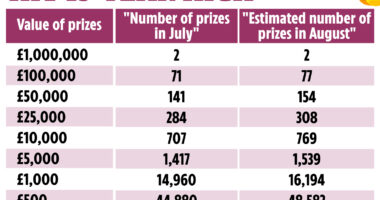
Lloyds Bank, Monzo and Starling reimburse less than half the money that has been lost to scams, according to a shocking new league table that names and shames the banks leaving customers high and dry.
For the first time, banks have been ranked according to the rate at which they reimburse victims of scams.
The report, published yesterday by the Payment Systems Regulator (PSR), reveals a dramatic gulf between banks’ willingness to reimburse.


Rankings: For the first time, banks have been ranked according to the rate at which they reimburse victims of scams
Of Britain’s biggest 14 banks, Monzo customers are most likely to be victims of fraud but least likely to receive a full refund. The online bank pays out in full to just 6 per cent of victims.
Until now, banks have refused to disclose what proportion of customers get a full refund. There is no consistent standard across the industry at present, as banks are not obliged to pay off losses to scams.
Because each bank has its own rules, Money Mail often hears from victims refunded by one bank but not by another. The PSR’s new report lays bare the scale of inconsistencies.
TSB customers are most likely to get their money back when they have been tricked, with 94 per cent of those reporting a scam in 2022 receiving a full refund and 4 per cent receiving a partial refund. Overall, 91 per cent of all money lost to scams is refunded.
Nationwide, HSBC and Barclays all reimburse between 70 per cent and 78 per cent of lost money, with Nationwide paying a full refund to 91 per cent of customers. However, reimbursement rates drop off beyond this.
Respectively, Santander and NatWest pay out just 63 per cent and 62 per cent of all money swindled.
The worst of Britain’s five biggest banks is Lloyds, which refuses to reimburse more than half (51 per cent) of money lost.
Allied Irish Banks, which has more than 3.2 million customers, is the worst offender of all, coughing up a refund in just 12 per cent of cases and reimbursing 10 per cent of all money lost.


Sophisticated: Many banks refuse to pay out if customers have ignored warnings online or read over the phone – but fraudsters have become skilled at talking around such warnings
This is followed by Danske Bank and Monzo, which offer full refunds to just 7 per cent and 6 per cent of scammed customers and partial refunds to 10 per cent and 8 per cent.
The PSR finds that 141 in every one million Monzo transactions in 2022 were sent to fraudsters — the highest rate of all the biggest banks.
Rocio Concha, of consumer campaign group Which?, says: ‘These figures confirm what we have long suspected — that some firms would prefer to point the finger at blameless victims than take responsibility for customers losing money at the hands of sophisticated fraudsters.’
‘Monzo “point blank” refused me a refund’
Monzo customer Rebecca Hyde, 51, from Bath, fell victim to a ‘push payment’ scam that left just £4 in her bank account in April.
She says Monzo ‘point blank’ refused a refund when she reported the scam and shut her account, with no compensation.
It was only when Rebecca took her complaint to the Financial Ombudsman Service that she won a full refund, as the financial arbiter ruled her bank had wrongly denied her compensation.
Rebecca, a self-employed cleaner, says she received a call in April from a man named James who said he worked at Monzo and was calling to report suspicious activity on her account.
She says she gave him no personal details but did follow his instructions to push through a notification on her phone, then switch it off. In that time, £2,193 was charged to a Co-op shop in London. ‘I had to fight because Monzo said I had defrauded myself,’ she says.
Many banks refuse to pay out if customers have ignored warnings online or read over the phone. But fraudsters have become skilled at talking around such warnings.
Banks will soon be required to reimburse
Paul Davis, director of fraud prevention at TSB, says it is time customers see the level of fraud refunds provided by their bank — which TSB has been publishing for four years.
From next year, under new rules banks will have to reimburse all victims of ‘authorised push payment’ scams within a week of the incident being reported.
They typically happen when a victim is tricked into transferring money to a fraudster pretending to be from an organisation such as a bank, or a family member or friend.
Both Lloyds and Monzo say they have invested heavily in prevention systems.
Ashley Hart, director of fraud and disputes at Monzo, says: ‘Being a victim of fraud is extremely distressing. Our focus is on preventing it from happening in the first place.’
Liz Ziegler, fraud prevention director at Lloyds Banking Group, says: ‘Protecting our customers from fraud is our priority and more than 80 per cent of our customers receive a refund, including two-thirds of victims who receive a full refund.’








